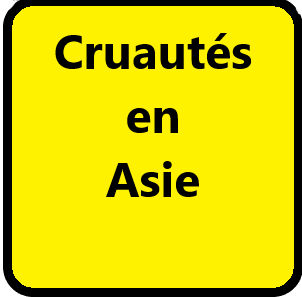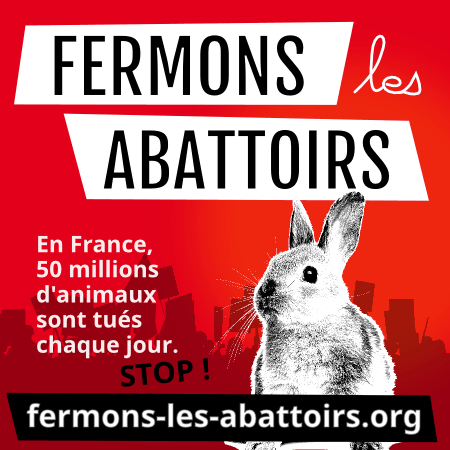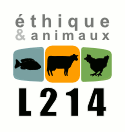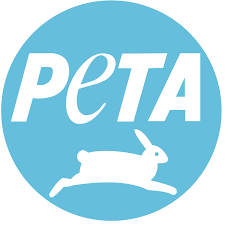Nos actions
 |
 |
 |
 |
 |
 |
Association Animalia
Animal defender association
in France
Cette adresse e-mail est protégée contre les robots spammeurs. Vous devez activer le JavaScript pour la visualiser.
Fax : 0033 0184106531
Object : open letter against torture on millions of animals in Asia
The animal welfare associations in the world demand to the Government of the following countries China, South Korea, Thailand, Vietnam, The Philippines, Indonesia, Cambodia and Laos
to stop the barbarity and intense cruelties against animals by
the dog and cat meat
the fur and exotic-skins industry
the bile farm bears
the tiger farms
A civil society should not allow such cruel practices.
Asians are famous for mistreating animals.
Asians have bad reputations concerning the way they treat animals. That must change. The tourists will never visit your country because you are so cruel to animals.
The whole world is horrified, shocked and disguted.
You have a very bad image.
You are such evil towards animals.
This is barbaric. Horrific.
You cannot consider yourself as a civilized nation because of the way you treat animals.
Dog cat meat
Dogs and cats are tortured, skinned alive, scalded alive, hanged, struck to death on the ground or with an iron stick or burned alive ! The dogs and cats are being bludgeoned, butchered and blowtorched for meat.
Days after Express.co.uk highlighted how killing pets in blood-soaked street markets was creating dangerous rabies risks, officials in the Far East have ordered an outright ban.
The cat and dog meat trade has negative impact on public health, animal welfare, and tourism, the trade puts both locals and tourists alike at risk from dangerous diseases, such as rabies, with reports surfacing that some dog and cat meat sold at these markets is infected with the deadly virus.
Dogs and cats are domestic companions not food.
Conservative estimates suggest that over 30 million dogs are farmed, traded and slaughtered for human consumption in Asia alone each year.
Numerous investigations throughout Asia have documented the severe cruelty inherent in all stages of the dog meat trade- farming, sourcing, transport, sale and slaughter.
The theft of dogs by criminal gangs to supply the demand for dog meat is also an ever-growing problem in many countries in the region, including Vietnam and China. Stolen pets and dogs collected from the streets and rural communities are then transported to the cities on filthy, overcrowded trucks, posing a significant risk to rabies and other communicable disease transmission.
The investigation shows animals being thrown from a bus, and into boiling water.
In the film, dogs and cats packed by the dozen into wire cages little bigger than lobster pots are pictured being thrown from the top deck of a converted bus onto concrete pavements.
The screaming animals, many with their paws now smashed from the fall, are then lifted out with long metal tongs and thrown over a seven foot fence.
They are then killed and skinned for their fur.
Yulin festival in China is famous for his barbaric festival. The Chinese are all categories gold medal in animal cruelty.
In South Korea, dogs intended to be eaten as a "traditional" dish live a real ordeal. Taking advantage of the framework of J.O. of Pyeongchang, a video published by the HuffingtonPost last year returns on the abuse to which these animals are subjected in the breeding, creating again the indignation. We call for tougher legislation to end this disastrous industry.
In South Korea, dog meat is traditionally associated with so-called energetic virtues. At least for a small part of the population. Although the younger generations seem to be turning away, the demand remains present, at least enough to cause the sacrifice of several hundred thousand dogs each year.
As the pictures of HuffingtonPost, whose teams have visited one of the farms, show, the dogs live in deplorable conditions. Locked in raised cages above their own droppings, dogs are desperately short of space, freedom and basic care. The breeders themselves have difficulty in living their activity, the dogs are fed a porridge composed of the remains of restaurants and canteens. At the age of two, at the end of their development, the dogs are shot, by electrocution, and sometimes by hanging, according to a breeder interviewed in the HuffingtonPost video which explains: "We hang the dogs because electricity costs too much.
In Asia every day, many dogs and cats are tortured to death and / or cooked alive. The dog meat trade involves genuine intentional torture. This is the very foundation of this industry. Dogs endure extreme pain, terror and are brutalized by monsters.
Many videos are circulating on Facebook ... including this one:
Three men catch a live dog and throw it into a cauldron of boiling water. As the dog starts screaming in pain, the men are laughing! The dog tries desperately to escape. Two of the men hold it and put a lid on the cauldron
WE DEMAND YOU TO STOP THE HORRIBLE CAT AND DOG MEAT TRADE
Tiger farmings
According to the Environmental Investigation Agency (EIA), there are more than 200 tiger farming centres across Asia ranging in size from small to huge. These centres, spread across China, Laos, Viet Nam and Thailand, jointly house between 7,000-8,000 captive tigers – far more than the estimated 3,900 tigers left in the wild. In these farmings, the tigers are killed for a part of their bodies for medicine.
The tiger is in danger of extinction according CITES (Convention on International Trade in Endangered Species at Wild fauna and flora).
As the species is in danger of exctiction, we will file a lawsuit against you at the International Court of Justice
We ask you to place those tigers in sanctuaries, animal parks or reserves that the population can visit. Feed the tigers with seitan (seitan powder mixed with the nutrients they need and spirulina. The seitan will be less expensive than meat).
Fur and exotic-skins industry
Fur industry is a carnage
Hundreds of millions of animals are killed annually for the fur trade. Mink, foxes, raccoon dogs, domestic dogs and cats, seals, bobcats, beavers and rabbits are killed in enormous numbers each year.
Wearing fur or fur trim is cruel and unnecessary, especially when quality faux-fur alternatives are almost indistinguishable from the real thing. Whether caught in steel traps in the wild or spent their whole life in a cage on a fur factory farm, these animals suffer immensely.
The animals are enclosed in tiny metal wire cages. They sleep on wire mesh so that their droppings pass through the wire fence. They turn in circles in these tiny cages and go crazy. They are exposed to cold and rain and are not cared for if they are sick.
It is an immense cruelty for these animals.
Today’s fur industry relies on factory farming. It is estimated that 85% of fur comes from animals intensively bred and reared. This means millions of animals leading torturous lives – all in the name of fashion.
The rabbits spent months confined to a cage barely bigger than they were. The alive raccoon dogs who had their skin ripped off their body while they kicked and writhed in pain.
On fur farms, disease and injuries are widespread and usually left untreated.
China is now the biggest processor of fur products.
From 2013 to 2014, China produced 40% of the 87.2 million mink pelts produced around the world. China remains one of the biggest manufacturers of fox pelt, manufacturing over 91% of the 7.8 million fox furs produced globally.
China is the largest fur consuming market in the world, taking up more than 50% of global consumption.
Can you even imagine how painful skinning is?
Did you know not only mink, raccoon, chinchilla, rabbit, fox and angora, but also companion animals such as dogs and cats are used to make clothes and accessories ?
On Chinese fur farms, undercover investigators found that many animals were still alive and struggling desperately when workers skinned them.
When workers on these farms begin to cut the skin and fur from an animal's leg, the free limbs kick and writhe. Workers stomp on the necks and heads of animals who struggle too hard to allow a clean cut.
Sir Paul Mc Cartney, and his wife Heather, looked aghast and close to tears as they watched the footage for a special report for the BBC's Six O'clock News.
They urged people not to buy Chinese goods.
"This is barbaric. Horrific," said Sir Paul.
"It's like something out of the dark ages. And they seem to get a kick out it. They're just sick, sick people.
"I wouldn't even dream of going over there to play, in the same way I wouldn't go to a country that supported apartheid. This is just disgusting. It's just against every rule of humanity. I couldn't go there."
In another piece of the harrowing footage, shot this summer by an undercover investigator connected to the People for the Ethical treatment of Animals (Peta) campaign group, cats are seen squirming inside a sack which is then thrown into a vat of steaming water.
They are boiled to death and skinned by a fleecing machine similar to a launderette tumble drier.
Some of the 28-minute footage is too gruesome to be broadcast.
Campaigners estimate that over two million dogs and cats are killed for their fur in China every year. China also farms animals such as mink for their fur and makes over half of the world's fur products.
McCartney added: "How can the host nation of the Olympics be seen allowing animals to be treated in this terrible way?"
Heather McCartney, herself a vociferous animal rights campaigner added: "I've seen so much footage where these poor creatures are clearly alive when they're skinned. And for what? For fashion? It's sick.
"People in every other country in the world should now boycott Chinese goods."
Dogs were seen in grim conditions
"If they want to consider themselves a civilized nation," said Sir Paul, "they're going to have to stop this."
His spokesman, Phillip Todd, told the BBC: "As a human being, the commissioner abhors this trade and is very supportive of there being a ban. There are, however, legal obstacles which would need to be addressed before a ban could be put in place."
Exotic skins :
The snakes, alligators, crocodiles, and other reptiles who are killed for their skins suffer immensely. Snakes are commonly nailed to trees and their bodies are cut open from one end to the other as they are skinned alive, in the belief that live flaying keeps the skins supple. Their mutilated bodies are then discarded, but because of these animals’ slow metabolism, it can take hours for the snakes to die. Lizards are often decapitated, and some writhe in agony as the skin is ripped from their bodies. Most alligator skins come from farmed animals who are raised in crowded tanks or pools of fetid, stinking water. The animals are shot or crudely bludgeoned with hammers. Workers sometimes use a mallet and chisel to sever crocodiles’ spinal cords—which paralyzes, but does not kill, the animals. Herpetologist Clifford Warwick, a specialist in reptile biology and welfare, says, “There is no scientific question as to whether alligators are capable of feeling pain and sensitivity to stress—they are.” Dr. Warwick also found that farmed crocodiles often “develop abnormalities and deformities because they can’t walk or swim” in the crowded enclosures.
There are few laws to protect reptiles from abuse, and those that do exist are often not enforced. For example, although animals such as anacondas and crocodiles are covered by Convention on International Trade of Endangered Species (CITES) regulations, it is estimated that for every animal who is legally killed for the exotic skins trade, another will be illegally poached. In the United States, reptiles are excluded from the meager protections afforded by the Animal Welfare Act. In addition to being cruel, this industry is extremely wasteful: It can take the skins of four crocodiles to make a single bag.
We demand you to stop your horrible fur and exotic skins industry and their trade. And to replace the torture fur by the fake fur.
Bear bile farming
Most farmed bears are kept permanently in cages, sometimes so small that they are unable to turn around or stand on all fours.
Some bears are caged as cubs and never released, with many kept caged for up to 30 years.
Most farmed bears are starved and dehydrated, and suffer from multiple diseases and malignant tumours that ultimately kill them.
On bile farms, bears are seen as mere production units, only worth the amount of bile they produce. Animals Asia has also seen instances of old or very sick bears – those who fail to produce bile – simply left to starve to death in their cages.
Bear's bile is extracted using various invasive techniques, all of which cause severe suffering, pain and infection.
The method claimed to be the most 'humane' by bile farmers, is 'free-drip' method, where bears undergo surgery to create a permanent open passage from their gallbladder through their abdomen.
The surgery is crude, unhygienic and rarely performed by a veterinarian. This results in many of the bears dying from infections or other complications, and agony for those who do survive.
As the body naturally tries to heal itself, each bile tapping session then involves forcing a metal tube through the wound and scar tissue to reach the bile stored in the bear's gallbladders.
Other methods include the permanent surgical implantation of a metal or latex catheter which drains the bile straight from the bear's abdomens.
Some bears are even fitted with 'metal jackets'. Reminiscent of a medieval style torture device, it is designed to keep bile-draining catheters in place. Heavy and typically rusting, they restrain bears movement using sharp spikes and strips of metal.
We demand the replacement of the bear bile by plants. The plants work well.
Gandhi said : The size of a nation can be judged by the way animals are treated.
You must change your bad image.
The whole world is disgusted.
You are so evil.
___________________________________________________________________________
Lettre au Président de l'OMS pour interdire les marchés humides, la viande de chien et de chat, les fermes de biles à ours et fermes de tigres dans le monde entier
La lettre






